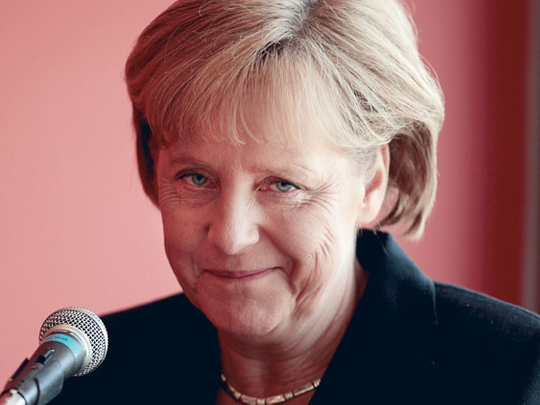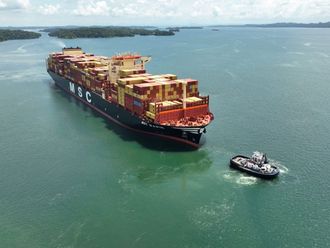
Paris/Berlin/Brussels: When Angela Merkel appeared to dictate the terms of a euro zone rescue package for Greece last month — unsubsidised loans as a last resort and subject to a German veto — she was widely depicted at home and abroad as Germany's "iron chancellor".
Two weeks later, as the euro zone edges closer to bailing Greece out, she no longer looks like the "Frau Nein" she was dubbed by the media.
After post-Easter market jitters and a sovereign debt downgrade pushed Greek government borrowing costs to a 10-year high, Merkel last week signed up to a deal whereby euro zone governments would provide 30 billion euros (Dh150 billion) in loans below market rates.
Details of the bail-out were announced after a lengthy conference call on Sunday in which finance ministers literally drafted a statement between them,
It was the culmination of the latest — but probably not the last — phase of improvised policymaking that has characterised Europe's tortuous response to the Greek debt crisis.
In February, Europe promised to stand by Greece in an effort to calm investors' fears over Athens' fiscal deficit. But it was not enough to satisfy the capital markets. In March, EU leaders set out the principles of a bail-out. That was still not enough.
"Politics is the art of the possible," said Olli Rehn, European commissioner for economic and monetary affairs. "That applies for the making of economic policy in the euro zone as well."
Some parts of the German media accused the chancellor of buckling under pressure from other leaders.
According to some reports, Merkel was "bounced" by Nicolas Sarkozy, French president, and Silvio Berlusconi, the Italian prime minister, who threatened to bail out Athens on their own
French officials say there was no question of France and Italy going it alone. "She's not really the type of woman you can bounce," said one. Another official said the point was to get Germany to stand by the euro zone's agreement to act collectively, not to rip it up.
In any case, Sarkozy would not have taken the risk of seeing the narrow spread of French government bonds over German bunds widen dramatically as a result of a unilateral bail-out.
French officials say that after meeting Berlusconi in Paris yesterday, Sarkozy spoke on the telephone to Jean-Claude Trichet, the president of the European Central Bank, José Manuel Barroso, the European Commission president, and Herman Van Rompuy, the EU's permanent president.
Persuading the markets
They agreed that discussions over the details of a bail-out had to be wrapped up and announced to the markets. An official said the aim was to persuade the markets "we really had the loaded gun they wanted".
Sarkozy called Merkel. His aim was to persuade her that the deal reached at the end of March — ostensibly on her terms — needed to be fleshed out.
The French president was prepared to call a fresh summit of euro zone leaders to resolve the issue. Merkel "hesitated on the degree of urgency" but it "was not a very difficult conversation".
The ground had been prepared by senior officials from finance ministries and the Commission who had spent much of the week in technical talks — likened by one Commission official to a "village market".
Officials on both sides of the Rhine and in Brussels say the arguments between the French and German leaders were much more vehement — and the decisions more momentous — before the summits in February and March, when the euro zone decided on the principles of a rescue.
Once Merkel had signed up to an outline "last-resort" bail-out in March, Berlin acknowledged it needed to follow through with further detail.
"We know we have to get this agreed as quickly as possible," said one German official after a shaky Greek government bond auction before Easter. "We have to show the markets that we have the implements to convert the political agreement reached by the leaders at the end of March."
French officials say this fits with the pattern of German responses to the financial crisis: a period of denial followed by recalcitrance, then co-operation.
One of the sticking-points was the interest rate.
Merkel insisted that Greece had to pay the rates it was then paying on the markets for 10-year bonds — some 6 per cent to 6.5 per cent — to minimise the risk of the Constitutional Court barring Berlin's participation in any sort of bail-out.
The nightmare scenario for many members of Merkel's party is that Greece calls for help before a regional election on May 9, one Merkel must win to maintain a majority in the Bundesrat, parliament's upper house.
This is one reason, some MPs suggest, why Berlin could be minded to push any decision about help beyond that date.












